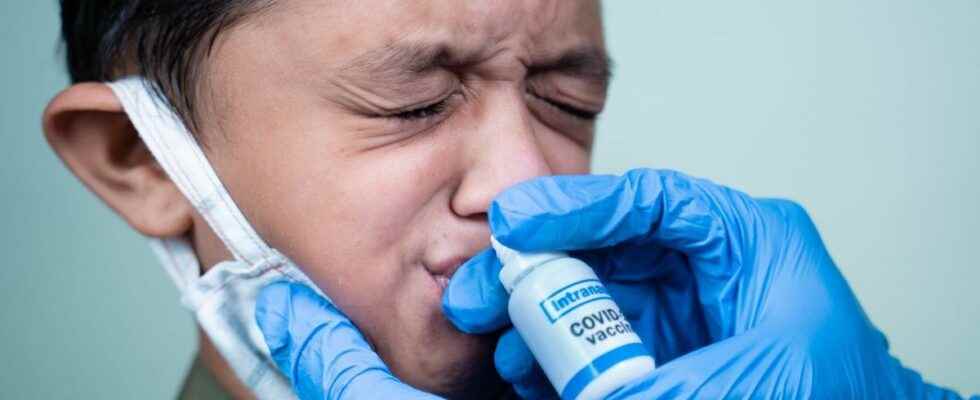Published on
Updated
Reading 3 mins.
The failure of the trial conducted by the University of Oxford and Astrazeneca on their candidate nasal vaccine seriously dampened the hopes raised by this route of administration. Should we therefore abandon this line of research? No, for several experts who believe that it could tomorrow offer more effective protection than a conventional injection.
Such a vaccine, which can go through an aerosol spray or even drops like a physiological saline, is indeed of theoretical interest: by acting through the respiratory tract, in particular the mucous membranes, it could prevent from the outset the coronavirus infection.
A promising route of administration but few positive data
This would be a big step up from current Covid vaccines. These remain very effective against serious forms but are far from preventing simple contamination.
In some countries, these nasal vaccines are on the way to becoming a reality. Two of them have just been approved, respectively in China and India, at the end of the summer.
But these authorizations were given without public data attesting to a greater effectiveness of these vaccines against catching Covid.
And, more recently, this line of research suffered a major setback. In the United Kingdom, researchers from the University of Oxford, who were studying the interest of administering the AstraZeneca vaccine through the nose, announced in early October the failure of a first clinical trial.
At the end of it, carried out on about thirty people and published in the journal eBioMedicinethe patients had developed a weaker immune response than with conventional vaccination by injection.
The track of nasal vaccines remains interesting
However, for the scientists interviewed by AFP, this failure does not invalidate the track of nasal vaccines.
You don’t have to”be too discouraged“by these results, assures virologist Connor Bamford, of Queen’s University of Belfast.
Even when they are bad, he points out, such results provide a basis for going further, understanding what went wrong.
He notes, for example, that the rare nasal vaccines in circulation – against influenza or polio – are “live”: they use an attenuated version of the virus to stimulate the immune system.
This is not the case with the AstraZeneca vaccine – developed with the University of Oxford – which works by “viral vector”: a virus, harmless and distinct from the coronavirus, carries part of the latter’s RNA.
Lack of funding
Would a live anti-Covid vaccine be more successful? Maybe. The Oxford researchers raise another hypothesis: their spray does not reach far enough and the vaccine could be effective if it reached the lungs.
“It is possible that this nasal vaccine is simply swallowed and destroyed by the stomach – we would avoid that if it reached the lungs“, advanced in a press release the researcher Sandy Douglas, who carried out these tests.
One element, in any case, is a good omen. No serious side effects were noted, either during this trial or those conducted for the Chinese and Indian nasal vaccines.
But promoters of nasal vaccines don’t just face scientific challenges. They are very likely to suffer from a lack of demand: in many countries, especially developed ones, doses of vaccines have already accumulated.
A French project has thus suffered from this situation. biotech TheraVectys was launched in 2020, in concert with the Pasteur Institute, in the development of a nasal vaccine.
But this one never passed the stage of animal tests, however promising.
“We have not aroused the interest of funding organizations, nor of +big pharmas+, to initiate the clinical phases in humans“, reported to AFP Pierre Charneau, who led the scientific part of this project.
To be funded, such research must indeed convince of their interest, which is not obvious while the existing vaccines remain very effective against deaths and hospitalizations.
What good then? It is a question of succeeding in interrupting the epidemic waves, suggest certain players in the stammering sector of nasal vaccines, such as the American biotech Meissa.
“The only way to take control of this virus is to break the chains of transmission. (…) With a nasal vaccine, we can do it“, advances to AFP Martin Moore, its scientific manager.
